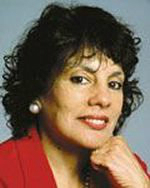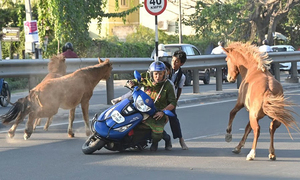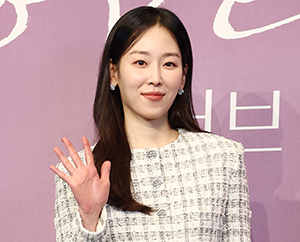‘어머니 리더십’으로 민심 사로잡아
 독일 총리 앙겔라 메르켈은 바지를 즐겨 입고 머리 모양에 대한 여론의 질책에 시달리며 눈 아래 노화의 징후를 드러내고 있으나 비슷한 외모의 힐러리 클린턴과는 아주 다르다. 국제사회의 지도자로 등장한 메르켈은 엘리너 루스벨트가 아니라 마거릿 대처를 본받는다.
독일 총리 앙겔라 메르켈은 바지를 즐겨 입고 머리 모양에 대한 여론의 질책에 시달리며 눈 아래 노화의 징후를 드러내고 있으나 비슷한 외모의 힐러리 클린턴과는 아주 다르다. 국제사회의 지도자로 등장한 메르켈은 엘리너 루스벨트가 아니라 마거릿 대처를 본받는다.
얼마 전 총선에서 압도적 승리를 거두어 독일 총리를 3번째 연임한 메르켈은 유럽연합 안에서 근검절약 정신을 인정받는다. 메르켈은 엄한 사랑이 자녀에게 좋다고 생각하기 때문에 엄격한 정책을 고집한다는 사실을 잘 아는 독일인은 그녀를 어머니처럼 친근하게 생각한다. 절약을 덜 하는 유럽 국가들은 이런 메르켈을 두려워한다.
유럽의 일부 만평가들은 히틀러의 콧수염을 달고 비스마르크의 철모를 쓴 메르켈의 모습을 그리고 있으나 독일 국내에서 메르켈의 인기는 여전히 높다. 그녀는 2009년 총선 때보다 7%포인트 높은 득표율로 재선되었다. 프랑스, 이탈리아, 스페인을 포함한 유로존의 다른 나라 지도자들은 경기침체로 국가재정이 어려워진 후 모두 재선에 실패했다. 메르켈은 경제위기를 극복하여 승승장구하고 있다.
일부 독일 신문은 기사제목에서 “앙겔라 대제”라는 과장된 표현을 쓰고 있으나 이 표현은 독일 내부의 실제 분위기를 전달한다. 이 표현은 특히 현명하고 실용적인 메르켈식 정치 전략을 묘사할 때 사용된다.
그녀는 평범한 복장처럼 평범한 어조로 말한다. 독일인들은 21세기의 이 시점에서 자국 지도자가 화려한 카리스마 대신 시종일관 냉철한 태도를 보이는 데 안도하는 듯이 보인다. 제3제국에 대한 고통스런 죄의식과 뒤이은 동독 비밀경찰의 악행으로 인한 걱정은 이제 모두 역사의 쓰레기통 속으로 사라지고 국민 정서는 안정된 안도감으로 바뀌었다.
메르켈은 근면하고 꾸준한 독일인을 상징하며 이런 독일인은 그녀의 정책을 지지하고 그리스식 재정낭비를 억제한 자국 총리에게 감사한다.
그녀의 보수주의는 위험한 개연성에 집착하지 않고 가능한 것만을 보존하는 것을 의미한다. 비판자들은 모든 정책을 타협 대상으로 삼는다고 비난하지만 지지자들은 그녀가 작은 것을 버리고 큰 것을 선택할 뿐이라고 말한다. 그녀가 중시하는 것 가운데는, 낭비하는 국가들에게 백지수표를 써 주지 않는 가운데 유로화를 지키는 것이 포함된다.
이번 총선 후 연정수립 과정의 최대 관심사는 메르켈이 긴축정책을 완화할 것인지였다. 긴축 강화 쪽을 걱정한 그리스의 한 만평가는 왕관을 쓰고 유럽에 군림한 메르켈의 모습을 그렸다. 영국의 영향력 있는 좌파 잡지인 뉴스테이츠맨이 그녀를 “터미네이터: 유럽의 가장 위험 지도자”라고 묘사했던 것이 불과 얼마 전 일이었다.
총선 승리 후 첫 번째 기자회견에서 그녀는 “개혁 과정은 단순한 긴축이 아니라 경쟁력과 견실한 정부예산의 유지이며 독일에 투자하는 사람들을 보호하는 것”이라고 말했다. 그녀는 독일이 안정된 정부를 유지할 필요가 있다고 강조한다. 10년 전에 독일이 ‘유럽의 병자’였다면 지금의 독일은 ‘안정의 닻’이다. 그런 변화가 여당을 이번 총선의 승리로 이끌었다고 메르켈은 믿는다.
클린턴이 국무장관으로 재직 중 메르켈을 방문했을 때 한 신문이 두 여성 지도자의 허리 아래 부분의 사진을 게재하고 독자들에게 누구인지 구별할 것을 요청했던 적이 있다. 두 여인의 차이점은 남편의 경우에서 확연히 드러날 것이다.
메르켈 총리는 재혼했으나 첫 남편의 성을 그대로 쓴다. 가끔 공식석상에 함께 나오지만 총리의 지금 남편의 이름이나 신상에 관해 아는 독일인은 드물다.
그녀는 항상 혼자 무대의 중앙에 서 있으며 독일인들은 메르켈의 그런 모습을 좋아한다. 그녀가 선 무대에는 미국 남부의 바람둥이 남편이나 총리 노릇을 함께 하려 드는 남편이 없다.
수전 필즈 美 칼럼니스트
워싱턴타임스·정리=오성환 외신전문위원
Channeling Margaret Thatcher
By Suzanne Fields
She likes pantsuits, suffers public attention to her coif, and shows telling signs of age with unflattering puffs under her eyes. But Angela Merkel is no Hillary Rodham Clinton. As a world leader, she’s channeling Margaret Thatcher, not Eleanor Roosevelt. This lady is famously “not for turning.”
The chancellor of Germany, just elected for a third time in a landslide, is appreciated for her austerity in the European Union. Her countrymen call her “Mutti,” or “Mother,” with affection but with a certain formality, recognizing that she’s hanging tough because she thinks tough love is good for you. She makes the less-thrifty European countries fear her sustained pocketbook power.
Some European political cartoonists draw her with a Hitler mustache or a Bismarck helmet, but the iron lady of Germany is obviously popular in her own country. She was re-elected by a margin of more than 7 percentage points above her prior re-election in 2009. Heads of other eurozone countries, including France, Italy and Spain, were not re-elected after the recession rattled their treasuries, and she not only survives the economic crisis, she triumphs through it.
“Angela the Great,” as some of the hyperbolic German headlines describe her, captures the zeitgeist with neither dazzle nor sparkle. The words most often used to describe her political strategy range from prudent to pragmatic. She’s as plain-spoken as her plain dress. The Germans seem relieved that on this side of the bridge to the 21st century, flamboyance and charisma have been replaced by the comforting normality of sobriety and even temperament. The agonizing guilt over the Third Reich, followed by the anxiety and paranoia of the East German Stasi, both now in the garbage can of history, have been replaced by a steady sense of security.
Mrs. Merkel represents the hardworking, steady German who supports her policies and is grateful that she reined in the extravagance of the Greeks bearing gifts for themselves. She’s certainly no St. Angela, as some paint her, and she lacks the purity of the do-or-die politics that Germans find unpleasant (and puzzling) in America. Her conservatism means preserving what’s possible without falling on the sword of the improbable. While her detractors say there’s no policy she won’t compromise, her supporters say she merely preserves the important while giving in on the less important, like saving the euro without signing blank checks to the profligate countries.
Now that her center-right Christian Democrats are negotiating with the center-left Social Democrats (SPD) as a coalition partner, the big questions are whether she will be a “milder Merkel” or a more “austere Angela,” whether she’ll compromise more or become a tougher chancellor. A Greek newspaper cartoonist, fearing the latter, portrays her with a crown on a throne presiding over Europe, and it wasn’t so long ago that the New Statesman, an influential magazine of the British left, portrayed her as the “Terminator: Europe’s most dangerous leader.”
At her first news conference here in Berlin after her re-election, she said that “the process of reforms isn’t just a process of austerity, but of competitiveness and solid budgets; it’s about the confidence of investors in our country.” She insists that “Germany needs a stable government.” If, a decade ago, Germany was the “sick man of Europe,” now it’s “an anchor of stability.”
Such change, she believes, led her to win big in this election, 16 percentage points above the Social Democrats, her potential junior coalition partner. She still must woo that center-left party to join her, a party that remembers how miserably it fared in her first term when the SPD was relegated to a place deep in her considerable shadow. The party suffered. This time they’re trying to play harder to get, figuring they can extract concessions on domestic policy by going for them early. They want the establishment of a minimum wage and cancellation of a subsidy for stay-at-home mothers in order to expand state day care. A cartoon in the newspaper Tagesspiegel depicts Frau Merkel as a cat, teasing the SPD mouse from its hidey hole.
When Mrs. Clinton, as secretary of state, visited Chancellor Merkel, a newspaper photograph showed the two women from the waist down, each in a different colored blazer and black trousers, asking the viewer to try to tell them apart. With their husbands, the difference would have been dramatic. Frau Merkel has been married twice, and kept the name of her first husband. Few Germans know anything about her current husband (or even his name), although he occasionally attends public events. She stands alone on center stage, and the Germans like it that way. There’s neither Bubba nor “co-chancellorship” here.
By Suzanne Fields
She likes pantsuits, suffers public attention to her coif, and shows telling signs of age with unflattering puffs under her eyes. But Angela Merkel is no Hillary Rodham Clinton. As a world leader, she’s channeling Margaret Thatcher, not Eleanor Roosevelt. This lady is famously “not for turning.”
The chancellor of Germany, just elected for a third time in a landslide, is appreciated for her austerity in the European Union. Her countrymen call her “Mutti,” or “Mother,” with affection but with a certain formality, recognizing that she’s hanging tough because she thinks tough love is good for you. She makes the less-thrifty European countries fear her sustained pocketbook power.
Some European political cartoonists draw her with a Hitler mustache or a Bismarck helmet, but the iron lady of Germany is obviously popular in her own country. She was re-elected by a margin of more than 7 percentage points above her prior re-election in 2009. Heads of other eurozone countries, including France, Italy and Spain, were not re-elected after the recession rattled their treasuries, and she not only survives the economic crisis, she triumphs through it.
“Angela the Great,” as some of the hyperbolic German headlines describe her, captures the zeitgeist with neither dazzle nor sparkle. The words most often used to describe her political strategy range from prudent to pragmatic. She’s as plain-spoken as her plain dress. The Germans seem relieved that on this side of the bridge to the 21st century, flamboyance and charisma have been replaced by the comforting normality of sobriety and even temperament. The agonizing guilt over the Third Reich, followed by the anxiety and paranoia of the East German Stasi, both now in the garbage can of history, have been replaced by a steady sense of security.
Mrs. Merkel represents the hardworking, steady German who supports her policies and is grateful that she reined in the extravagance of the Greeks bearing gifts for themselves. She’s certainly no St. Angela, as some paint her, and she lacks the purity of the do-or-die politics that Germans find unpleasant (and puzzling) in America. Her conservatism means preserving what’s possible without falling on the sword of the improbable. While her detractors say there’s no policy she won’t compromise, her supporters say she merely preserves the important while giving in on the less important, like saving the euro without signing blank checks to the profligate countries.
Now that her center-right Christian Democrats are negotiating with the center-left Social Democrats (SPD) as a coalition partner, the big questions are whether she will be a “milder Merkel” or a more “austere Angela,” whether she’ll compromise more or become a tougher chancellor. A Greek newspaper cartoonist, fearing the latter, portrays her with a crown on a throne presiding over Europe, and it wasn’t so long ago that the New Statesman, an influential magazine of the British left, portrayed her as the “Terminator: Europe’s most dangerous leader.”
At her first news conference here in Berlin after her re-election, she said that “the process of reforms isn’t just a process of austerity, but of competitiveness and solid budgets; it’s about the confidence of investors in our country.” She insists that “Germany needs a stable government.” If, a decade ago, Germany was the “sick man of Europe,” now it’s “an anchor of stability.”
Such change, she believes, led her to win big in this election, 16 percentage points above the Social Democrats, her potential junior coalition partner. She still must woo that center-left party to join her, a party that remembers how miserably it fared in her first term when the SPD was relegated to a place deep in her considerable shadow. The party suffered. This time they’re trying to play harder to get, figuring they can extract concessions on domestic policy by going for them early. They want the establishment of a minimum wage and cancellation of a subsidy for stay-at-home mothers in order to expand state day care. A cartoon in the newspaper Tagesspiegel depicts Frau Merkel as a cat, teasing the SPD mouse from its hidey hole.
When Mrs. Clinton, as secretary of state, visited Chancellor Merkel, a newspaper photograph showed the two women from the waist down, each in a different colored blazer and black trousers, asking the viewer to try to tell them apart. With their husbands, the difference would have been dramatic. Frau Merkel has been married twice, and kept the name of her first husband. Few Germans know anything about her current husband (or even his name), although he occasionally attends public events. She stands alone on center stage, and the Germans like it that way. There’s neither Bubba nor “co-chancellorship” here.
Copyright ⓒ 세계일보. 무단 전재 및 재배포 금지
![[설왕설래] 한·일 여권 없는 왕래](http://img.segye.com/content/image/2025/12/18/128/20251218518473.jpg
)
![[기자가만난세상] ‘강제 노역’ 서술 빠진 사도광산](http://img.segye.com/content/image/2025/12/18/128/20251218518441.jpg
)
![[세계와우리] 사라진 비핵화, 자강만이 살길이다](http://img.segye.com/content/image/2025/12/18/128/20251218518464.jpg
)
![[기후의 미래] 사라져야 새로워진다](http://img.segye.com/content/image/2025/12/18/128/20251218518446.jpg
)








